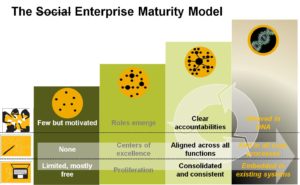 Are ‘social enterprise’ and ‘social business’ terms of the past? Last week, I had the opportunity to present my views on the corporate social maturity model at the Social Media Intelligence Summit organized by the Altamont Group. Some of my views, specifically that if we are successful with social media, the end state will be just called enterprise, and not social enterprise or social business, are quite controversial and I wanted to share my thoughts here as well.
Are ‘social enterprise’ and ‘social business’ terms of the past? Last week, I had the opportunity to present my views on the corporate social maturity model at the Social Media Intelligence Summit organized by the Altamont Group. Some of my views, specifically that if we are successful with social media, the end state will be just called enterprise, and not social enterprise or social business, are quite controversial and I wanted to share my thoughts here as well.
I have been reflecting on this topic for at least a year now, and many people have published their views on this. If you don’t believe me, just google ‘social media maturity model’, I got 1.7 million hits. My fundamental problem however with most of the ones I have seen is this:
Most start at some well-defined state where an organization has developed some (listening) capabilities and end at this nebulous thing called ‘social enterprise’ or ‘social business’.
Yes, I did google ‘social enterprise’ as well, and came up with 249 million hits; that is on top of the 2.9 million hits you get when you google‘ social business’. Based on my experience and beliefs, both of these are fallacies and do not reflect reality.
The over-arching message for me is that social media is a means to an end rather than end in itself. Success in social media is when the entire organization looks at it as a lever to achieve a certain business objective, regardless of whether you are in sales, marketing, product management, or customer service. In my opinion, there is no such thing as social business or social enterprise, the same way there is no such thing as a web business today.
So here are my thoughts: I believe there are four stages in total, and I have tried to capture some of the key differences across each stage.
The first stage (‘Organic’) is where employees in your companies start to experiment, frequently with little or no guidance or objectives, simply because they are intellectually curious or motivated. Many people will call these folks rogue, I personally like to think of them as pioneers or champions.
The second step (‘Enabled’) is where you start to see emerging roles and processes such as the so-called centers-of-excellence.
These first two steps are typically orderly but this is where chaos comes in. In my view, the end state (‘Embedded’) is where social media is just another tactic/channel, or whatever else you want to call it, that is fully embedded in your corporate DNA.
How you get there however varies. I have seen two dominant paths as companies evolve to this state:
The first way is the straight line. Once companies have built some of these enablement capabilities across some functions, they truly integrate social media across all their functions (e.g., sales, marketing, and customer service) with one coherent strategy.
The other way is where companies initially bypass the ‘Integrated’ stage and embed social in some of their functions, such as customer service. They will eventually come back and integrate all the functions but will typically do this later.
The reality is that we have already seen similar major disruptions in the past 20 years, whether it was Business Process Re-engineering (1990), CRM (Siebel, the CRM pioneer was founded in 1993), or the web (Netscape, the first web browser was founded in 1994). At each of these inflection points, we initially got enamored, but eventually moved on. Why should this time be any different? Would the ‘social enterprise’ exist had it not been for the web?
All of this really reminds me of Amara’s Law: “We tend to overestimate the effect of a technology in the short run and underestimate the effect in the long run”. My opinion is that the sooner we remove the word social media from our vocabulary, the shorter this journey will be.
 Of course, this topic is all the more timely given the recent uproar towards Salesforce’s attempt to trademark ‘social enterprise’. I personally believe they should take a page off their playbook and trademark this instead:-)
Of course, this topic is all the more timely given the recent uproar towards Salesforce’s attempt to trademark ‘social enterprise’. I personally believe they should take a page off their playbook and trademark this instead:-)
What do you think? Are my views totally off-the-mark? Am I really missing something? As always, your thoughts and comments are welcome.
For those of you that wish to look at my slides, I have embedded them below. They include some more details for each stage and transition to the next.
Hi Ted! It has been a long time since our last talk.
I totally agree when you say “social media is a means to an end rather than end in itself”. No argue on that.
What really brought me to your blog was the term Social Business, where I’m deeply involved and, in my “semantic” point of view, has absolutely nothing to do with Social Media. When talking about Social Business I’d prefer stay with Prof. Muhammad Yunus definition on that: “The new kind of capitalism that serves humanity’s most pressing needs“
Best.
Carlos, thanks for your comment. You are absolutely correct, I should have referenced this in my post. As a matter of fact, wikipedia defines both social business and social enterprise in very similar terms, and references Prof. Yunus’ definition. This is one of the key drivers of the recent uproar around Salesforce’s attempt to trademark ‘social enterprise’. Yet one more reason to eliminate the term from this context:-)
Agree! We had a similar issue when attempting to qualify our business that focuses on Yunus’ definition. Should be a Social Business or Social Enterprise? In the end, we decided to go for Social Business Enterprise… Not sure if others agree, but I’ll be glad if everybody else eliminates the terms from the context of your post!
Ted – great observation. The noise has probably become a bit too much. As you pointed out, this seems to be the familiar path of all tech buzzwords that ride the hype cycle and eventually merge with the mainstream. Amara’s Law is very appropriate in this context. eCommerce/ dotcom in is another example that has become part of the sales channel of most (not all!). I think buzzwords such as Social Enterprise & Social CRM will follow a similar trajectory.
I think it’s an interesting debate on the ‘Social’ word that generally means ‘socially responsible’ in most people’s vocabulary that again shows the insularity or bubble tech lives in 🙂
Hi Ted,
It’s funny I should only come across you AFTER you have left SAP.
I branded my website to basic show anyone who reads it or even visits it what I think about social business. I had the same logo and the idea of the strike through on the word social.
Great minds think alike. I think based upon the amount of time I have been in this industry it hasn’t taken me long to develop these views I think I might have to admit defeat and say you might have got there first! I remember the day was August 8th 2012 I first drew the no more social logo because I got fed up of calling it social this and social that.
I wrote a post which surprised a few people saying “I wish social was not in my job title” which has a simple concept to your post.
http://chrisheffer.com/2012/10/11/i-wish-social-was-not-in-my-job-title/
Although we may have taken different paths to get here we have ended up in a similar place.
I look forward to following your blog going forward.
Chris
Chris thanks, this is more than funny, it’s hilarious. We are even using the same language, I look forward to reading your blog as well
Ted